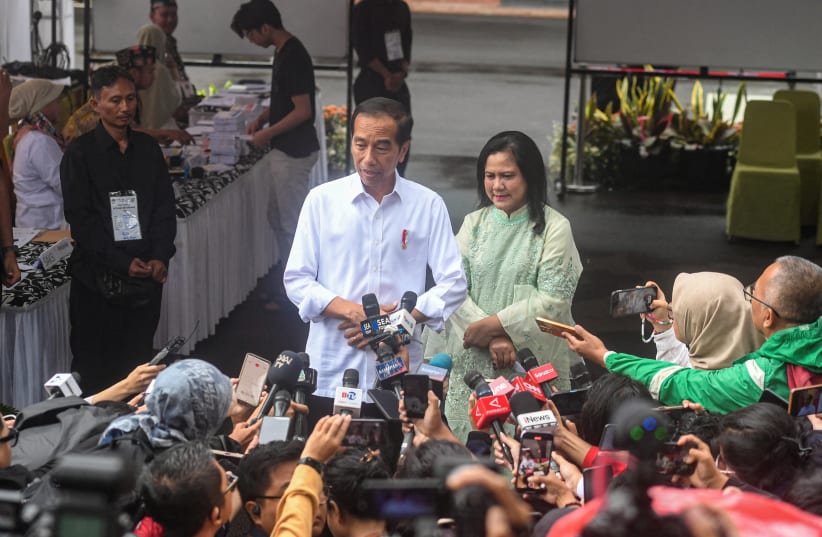Indonesians cast their ballots on Wednesday across the Southeast Asian archipelago in an election headlined by the race to succeed President Joko Widodo, whose influence could determine who takes the helm of the world's third-largest democracy.
Nearly 259,000 candidates are contesting 20,600 posts in the world's biggest single-day election.
But all eyes are on the presidency and the fate of the incumbent's ambitions to boost the country's status as an electric vehicle hub and extend a massive infrastructure push including a multi-billion dollar plan to move the capital city.
The race to replace Widodo, popularly known as Jokowi, pits two former governors, Ganjar Pranowo and Anies Baswedan, against controversial frontrunner Prabowo Subianto, a former special forces commander feared in the 1990s as a top lieutenant of Indonesia's late strongman ruler Suharto.
Two surveys last week projected Prabowo will win the majority of votes and avoid a second round.
Those surveys showed Prabowo with 51.8% and 51.9% support, with Anies and Ganjar 27 and 31 points adrift, respectively. To win outright, a candidate needs over 50% of votes and to secure 20% of the ballot in half of the country's provinces.
Novan Maradona, 42, an entrepreneur, said after voting in central Jakarta he wanted a candidate who would continue policies currently in place.
"If we start over from zero, it will take time," he said.
Indonesia has three time zones and polling stations across the country are now open, with voting in western areas due to close by 0600 GMT.
Voting got off to a slow start in Jakarta, with thunderstorms causing flooding in parts of the capital. At least 34 polling stations were affected, but the extent of delays was not clear nor whether it would impact turnout. Turnout in past elections has been about 75%.
Some polling stations in Central Java and Bali were decked out in pink and white Valentine's Day decorations, while others in West Java province handed out fruit to waiting voters.
Initial indications of the result are expected to emerge later on Wednesday, based on publicly counted votes from a sampling of polling stations across the country. In previous elections, the unofficial counts tabulated by reputable companies have proved to be accurate.
CALL FOR CLEAN ELECTION
Undecided voters will be critical to former Jakarta governor Anies and ex-Central Java governor Ganjar, to try to force a runoff in June between the top two finishers.
"I want to underline that we want honest and fair elections so that it becomes peaceful," Anies said at a polling station.
Deadly riots broke out after the 2019 election, when Prabowo who has run previously for president had initially contested Jokowi's victory.
Anies has campaigned on promises of change and preventing a backsliding in the democratic reforms achieved in the 25 years since the end of Suharto's authoritarian, kleptocratic rule.
Ganjar hails from the Indonesia Democratic Party of Struggle, of which Jokowi is ostensibly a member, and has campaigned largely on continuing the president's policies, but crucially lacks his endorsement.
Before voting, he also called for a clean election so that candidates could accept the result.
Defense Minister Prabowo said on Wednesday he hoped the "voting process goes well."
Prabowo is contesting his third election after twice losing to Jokowi, who is tacitly backing his former rival, seen as a continuity candidate to preserve his legacy, including a role for his son as Prabowo's running mate.
During his decade in office, Jokowi pushed to attract investment, introducing laws that slashed red tape and streamlined business rules. His administration's efforts to contain inflation have benefited millions and per capita income has risen, according to World Bank data.
PRABOWO REBRAND
The 72-year-old Prabowo has pledged to continue Jokowi's policies and at the same time transformed his image from a fiery-tempered nationalist to a cuddly grandfather figure with awkward dance moves.
Prabowo's more gentle characterisation, played out largely on short video app TikTok, has endeared him to voters under 40, who make up more than half of the 204.8 million electorate.
A 25-year-old student Keko Iyeres said he wanted to see improved education and justice.
"I like Prabowo because he is aggressive but can also be gentle. We need a leader like that. And I see that Jokowi also supports him."
But Jokowi's intimated support for Prabowo, plus allegations he interfered in a court ruling to allow his son to contest the vice presidency, have prompted criticism that unlike previous presidents he is not staying neutral over his succession.
Jokowi's loyalists have rejected that and it is unclear if the allegations will impact Prabowo.
Asked about allegations of foul play, including in a documentary called "Dirty Vote" that went viral on social media this week, Jokowi said there were mechanisms to report issues.
"If there is cheating on the ground, that can be reported to Bawaslu (the election watchdog) and then ... a petition can be brought to the Constitutional Court."

